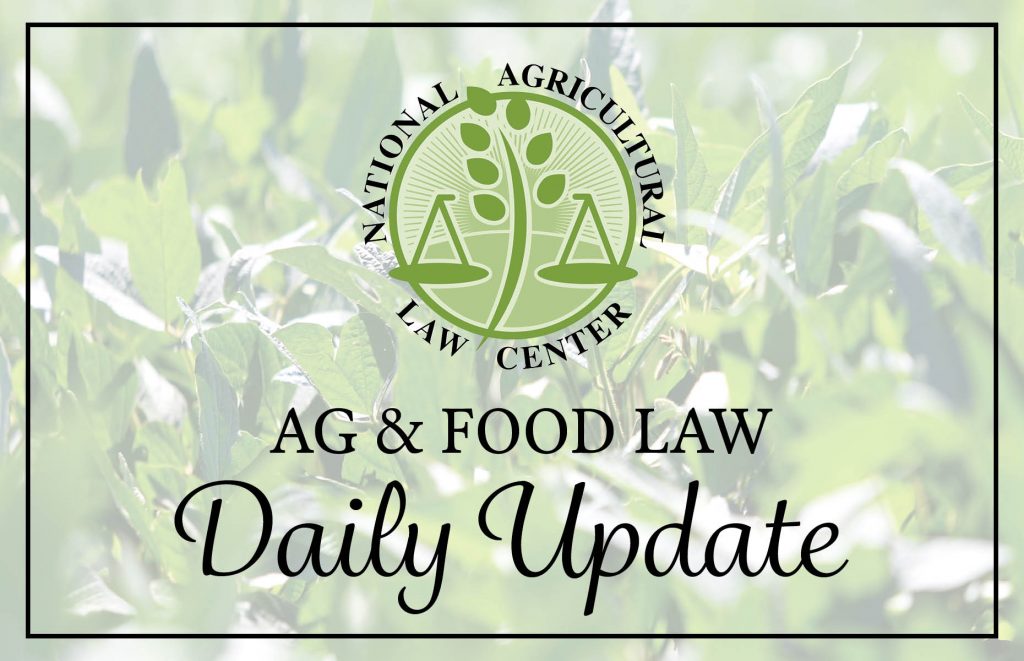A comprehensive summary of today’s judicial, legislative, and regulatory developments in agriculture and food. Email important additions HERE.
JUDICIAL: Includes Environmental Law, NEPA
In Food & Water Watch v. U.S. Dep’t of Agric., No. CV 17-1714 (BAH), 2020 WL 1479462 (D. D.C. Mar. 26, 2020), the plaintiff has brought suit against the United States Department of Agriculture (“USDA”) and the Farm Service Agency (“FSA”) under the National Environmental Policy Act (“NEPA”) to challenge an environmental assessment (“EA”) completed by the defendants “in connection with a ‘federal loan guarantee to construct and operate … a poultry concentrated animal feeding operation.’” The poultry concentrated animal feeding operation (“CAFO”) is owned an operated by a nonparty, One More Haul Farm, who received an FSA loan guarantee that it used to finance the construction of the CAFO.
Under NEPA, any proposed major federal action that may significantly affect the quality of the environment must undergo NEPA review to determine what effect the project may have and if any mitigation measures are needed. All federal agencies are required to comply with NEPA, but they are allowed some flexibility in adapting the statute’s implementing procedures. FSA has promulgated regulations that require NEPA compliance for activities that involve granting financial assistance for livestock-holding facilities, including granting loan guarantees to poultry CAFOs. Accordingly, before FSA granted the loan guarantee to One More Hand Farm, it underwent NEPA review of the project. That review resulted in the development of an EA, the first step of any NEPA review process, and a finding of no significant impact (“FONSI”). In other words, FSA concluded that granting a loan guarantee to One More Hand Farm would not have a significant impact. The plaintiffs initiated this lawsuit because they believe that FSA violated NEPA by performing an inadequate environmental assessment. According to the plaintiffs, the EA drafted by FSA should have concluded that the project was likely to impact the environment which would have prompted FSA to draft an environmental impact statement (“EIS”) instead of a FONSI.
In the action before the court, the parties both moved for summary judgment on the issue of NEPA violation. Essentially, the parties have asked the judge to review and decide the case entirely as a question of law because neither party disputes the facts. After reviewing the record before it, the court in this case concluded that FSA fully complied with NEPA and therefore granted the defendants’ motion for summary judgment. According to the court, FSA took the appropriate “hard look” required by NEPA at the potential environmental impacts of One More Hand Farm’s CAFO, properly relied on measures already in place that would mitigate those impacts, considered an adequate range of alternative actions, and reasonably determined that further NEPA review was not required.
LEGISLATIVE: Includes South Dakota, Utah, Virginia, Washington, West Virginia, Wyoming
SOUTH DAKOTA
HB 1008 legalizes the growth, production, and transportation of industrial hemp. Info here.
UTAH
HB 18 makes amendments to the industrial hemp program. Info here.
HB 28 addresses the Legislative Water Development Commission. Info here.
HB 39 addresses the Agricultural Water Optimization Task Force. Info here.
HB 41 addresses water policies. Info here.
HB 94 addresses applications for small amounts of water. Info here.
HB 95 addresses adjudication of claims to water. Info here.
HB 96 addresses issues related to forfeiture of water. Info here.
HB 198 excludes certain uses for which the eminent domain right may be exercised. Info here.
HB 228 addresses livestock predators removal. Info here.
HB 232 creates permitting guidelines for agritourism food establishments. Info here.
HB 358 clarifies provisions related to rulemaking for the slaughtering of poultry. Info here.
VIRGINIA
HB 24 adds horseback riding to the definition of “agritourism activity.” Info here.
HB 282 designates a 19.25-mile segment of the Maury River as a component of the Virginia Scenic Rivers System. Info here.
HB 408 extends the sunset date of the green job creation tax credit. Info here.
HB 764 provides that no owner or operation of a domesticated animal premises shall be liable for transmission of a domesticated animal pathogen. Info here.
HB 875 authorizes a locality to include in its zoning ordinances provisions to incorporate national standards of the use of solar panels. Info here.
HB 1090 designates a six-mile portion of Grays Creek as a component of the Virginia Scenic Rivers System. Info here.
HB 1237 changes the process for the granting of basic beehive units by the Department of Agriculture and Consumer Services. Info here.
WASHINGTON
HB 2217 concerns cottage food product labeling requirements. Info here.
HB 2624 concerns the authority of the direct of the Washington Department of Agriculture with respect to examinations and examination fees. Info here.
WEST VIRGINIA
HB 4217 amends state law authorizing certain agencies of the Department of Environmental Protection to promulgate legislative rules relating to ambient air quality standards. Info here.
WYOMING
HB 38 amends provisions related to inspections and remediation of weed and pest infestations. Info here.
SB 55 relates to hemp production, requires fees for compliance inspections and disposal verification. Info here.
